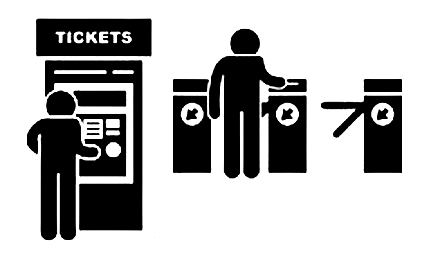Cost Sharing of Public Transit / Alternative Methods of Funding
Transit Is a Public Good. Everyone (not just riders) Should Pay For It.
alternative sources of revenue to pay operating costs
World Resources Institute, by O.P. Agarwal - May 07, 2018
http://www.wri.org/blog/2018/05/mass-transit-public-good-everyone-not-just-riders-should-pay-it
For some time, there has been an ongoing tussle between the Government of Delhi and the National Ministry of Housing and Urban Affairs about increasing fares for Delhi's metro rail system. While this instance is particular to Delhi, the same debate is happening in cities around the world: Who should pay for mass transit?
One camp believes mass transit, including buses and metro rail systems, should be paid for solely by rider fares. However, in Delhi's case and in general, mass transit provides benefits for all residents, not just riders. Cities need to think beyond fares as they figure out how to fund public transportation—and, in fact, many already are.
The Situation in Delhi / "a fare fixation committee"
Under the existing law, a fare fixation committee reviews the fares for the Delhi metro and periodically suggest revisions. This committee is an apolitical body, includes representatives from the Ministry of Housing and Urban Affairs and the Delhi government, and is, typically, chaired by a retired judge. It considers the operating costs, possible revenues at different fare levels, and then makes recommendations on fares. In October this year, the committee proposed a fare increase.
The Government of Delhi objected to this increase and were unwilling to allow its implementation. The Minister for Housing and Urban Affairs, rightfully, asked the Delhi Government to be prepared to pay $560 million (INR 36 billion) to the Delhi metro if they did not want the fares to be hiked. The fare increase has since been implemented, but the Delhi government has now stated that ridership dropped significantly due to the fare increase.
This dispute warrants a closer look at how the operating costs of any metro system need to be recovered. Globally, there are very few metro systems that recover their operating costs entirely from fare revenues. While Hong Kong, Singapore and London recover the full operating costs, most others don't. Paris recovers only around 30 percent, Chicago 42 percent, Boston 40 percent, Madrid 41 percent, Beijing 59 percent, and Vancouver 28 percent. A look at the Delhi metro's annual accounts for 2016-17 shows that fare revenues were around 60 percent of the operating costs. This means that metro rail systems need other forms of revenue to break even.
Who Benefits from a City's Metro System?
There are two very different issues that are getting mixed up in the current war of words. On the one hand, there is a cost incurred in operating the metro system and the operator needs to be compensated this amount. On the other hand, there is a fare that a user needs to pay.
The key question is this: Are the users of the metro system its only beneficiaries, and should the cost of operating the system be recovered solely from them? If fares were the primary source of revenue to pay for the operation of the metro system, it would imply that users are the only beneficiaries of the metro system. However, this is not true. There are several others who benefit from the system, even if they don't use it, and therefore, should also pay for it.
For example, people who use cars benefit from reduced congestion on the roads; people who own property near metro system benefit from increased property values; and employers benefit from having employees with easy access to work. Mass transit also reduces emissions, leading to cleaner air for everyone in the community. Unfortunately, under the present arrangement these beneficiaries do not contribute to the operating cost of the metro.
It needs to be recognized that fares cannot be fixed in such a manner as to pay for the cost of operations. Fixing fares needs to consider many other factors, including the ability to pay, benefits accrued to non-users and the contributions they need to make, and the benefits accrued to society by way of decreased vehicular congestion, cleaner air and savings in the use of non-renewable fuels.
Several cities around the world (PDF) have adopted a system whereby revenue from non-user beneficiaries contribute to the cost of metro operations. In Paris, about a third of the public transportation bill comes from a tax on companies' wage bill. In the United States, about a quarter of the gas tax is returned to public transport. Colombia even uses a "betterment levy," which captures the increased value of real estate that benefits from public transportation, to fund public transportation.
Cost Sharing via Positive Policy Action
The operating cost is a technical issue which is determined by factors like the cost of energy, the fuel efficiency of the engine, and staff salaries. The role of the fare fixation committee needs to be redefined such that they can determine fair operating costs, after considering operating efficiencies and input costs. Thereafter, public policy should determine how to allocate these costs to different beneficiaries.
Fares are a public policy issue which is to be determined based on political considerations of who should pay for the metro. It would be perfectly legitimate to say that all beneficiaries, and not just users, should pay for the metro. Public policy would determine who pays what share of the costs, provided the operator is reimbursed the full cost of operations.-
Citizens Taking Action
for public transit
Chicago, IL
Website
Facebook

